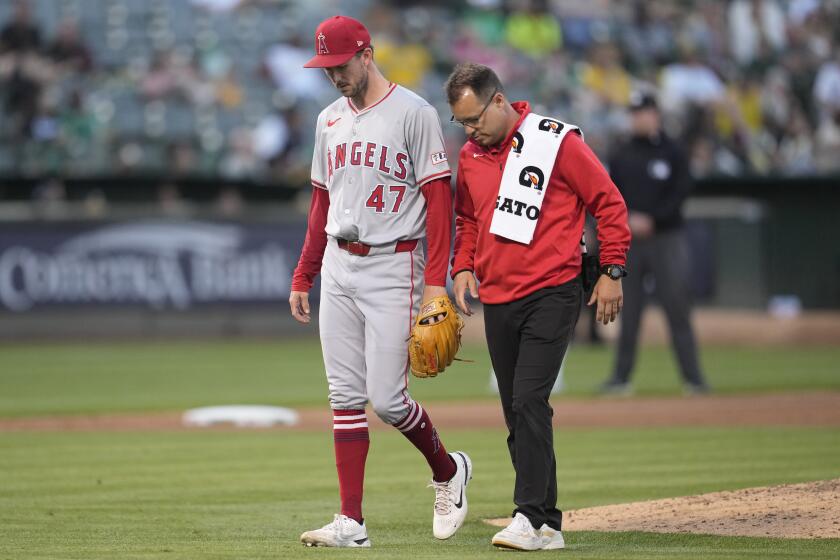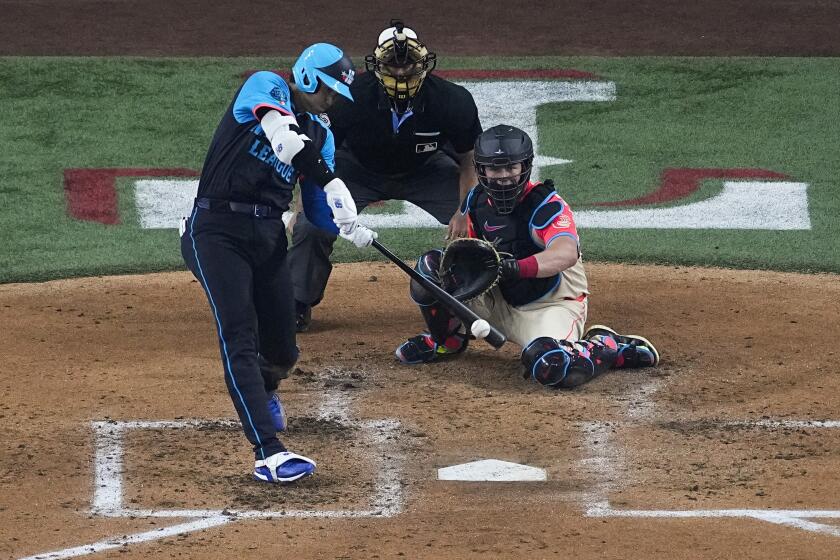Donnie Moore Dies in Apparent Suicide : Police Say Former Angel Reliever Repeatedly Shoots and Critically Wounds Wife, Then Turns Gun on Self
Former Angel relief pitcher Donnie Moore died Tuesday after he repeatedly shot and critically wounded his estranged wife, then turned the handgun on himself in their Anaheim Hills home, police said.
The apparent suicide and murder attempt came about a month after the 35-year-old pitcher was released by the Omaha Royals, a minor league club for which he played briefly after being dropped by the Angels last September. Neighbors and relatives said the couple had quarreled frequently in recent months.
Moore’s 35-year-old wife, Tonya, suffered at least three gunshot wounds to the upper chest and abdomen. She was driven by her 17-year-old daughter, Demetria, to Kaiser Permanente Foundation Hospital near their home, authorities said.
Moore’s wife collapsed and lost consciousness after arriving at the hospital and was rushed into surgery Tuesday evening, a hospital spokeswoman said.
Demetria and her two brothers--Donnie Jr., 10, and Ronnie, 7--were at the house when the gunshots were fired, but none of them were hit, police said. The children were taken in by relatives and friends after the shooting.
Friends, neighbors and relatives reacted with shock and horror.
“There was a lot more hurt down there than any of us probably realized,” said Angel broadcaster Joe Torre, who managed Moore when he was with the Atlanta Braves from 1982 to 1984. “He tried to come back, he tried to come back and he finally got cut loose.”
Despite achieving some success during his 13-year major league career, Moore may be best remembered for one pitch in Game 5 of the 1986 American League championship series, when he gave up a home run that helped the Boston Red Sox beat the Angels and go on to the World Series.
Anaheim police, responding to calls reporting gunshots at the couple’s house at about 4:40 p.m. Tuesday, discovered Moore sprawled on the kitchen floor with a single bullet wound to his head. A .45-caliber semiautomatic gun was found near the body, but not in Moore’s hand, Anaheim Police Lt. Marc Hedgpeth said. Bullet holes riddled the kitchen.
Hedgpeth said that at least one of Moore’s children witnessed the shootings.
“Based on the evidence found at the scene and statements from witnesses, all indications are that Donnie Moore and his wife, Tonya, became involved in an argument and during the argument, Mr. Moore produced a handgun, shot his estranged wife and then turned the gun on himself,” Hedgpeth said.
Hedgpeth said the department was unaware of any past domestic disputes at the Moore residence.
Hedgpeth said Tonya Moore had come to the house to visit her children sometime in the afternoon Tuesday. The children were playing in and out of the house when the couple began arguing.
At one point, Tonya Moore rushed outside to tell her children that their father had hit her, Hedgpeth said. The fight continued off and on. The children told police that after one heated discussion, Moore came into the kitchen with the gun. After the two exchanged words, Moore started shooting.
At the hospital, a woman who identified herself only as Tonya Moore’s sister said she talked with Tonya earlier in the day.
“We spoke earlier today and they were having a spat,” the woman said. Asked why the shooting might have occurred, she said, “If I knew why . . . “ She couldn’t finish, and simply shook her head.
Randall Johnson, attorney for the Moore family, said the family has experienced minor problems, and said that Moore was “somewhat upset . . . despondent” about his release from the Kansas City Royals’ triple-A team.
Johnson said the family had been discussing moving from the Anaheim Hills home and going to Texas, where both Moore and his wife have relatives.
Neighbors described Moore as a quiet man who often played basketball with his sons near the garage of the couple’s ranch-style home that sprawled over two acres.
But the Moores had experienced marital problems in recent months, neighbors said. The couple separated in mid-June, they said, about the same time that Moore was released after only seven games with the triple-A club in Omaha.
Virginia Christensen, 47, said Moore was “very emotional over what was happening to his life.”
“You just feel so emotional for him, especially for what he went through,” Christensen said. “I guess maybe he thought he lost it all.”
Her 16-year-old son, Keith, said he visited Moore often to talk about baseball and play with his sons, but noticed tension between the couple. They had separated, and Tonya Moore moved from the residence to Ontario by late June.
“He seemed real quiet,” Keith Christensen said. “Almost every day, I would come over and talk to him. He would talk, but you would have to start the conversation.”
Tonya Moore told one neighbor, Betty Bailey, that she wanted to leave her husband last November. “I didn’t get involved because I thought they were taking care of it,” Bailey said.
Both Moore’s pitching performance and his marriage seemed to unravel after the American League playoffs in 1986. He fell victim to a variety of injuries and his pitching suffered in the years that followed. In September of 1988 he was released by the Angels, but was signed in May by the Royals’ triple-A club. He was released June 12.
“He never seemed entirely happy about anything,” said Frank Adkisson, radio announcer for the Omaha Royals. “The guy was set for life financially. Whether he could still play or not, he had everything going for himself financially.”
Adkisson said Moore primarily kept to himself during his short time in Omaha, going so far as to pay extra so he could room alone on the road, an unusual practice in the minor leagues.
“One of the guys told me after he heard the news (of Moore’s death) that Donnie seemed like he was feeling bitter about something,” Adkisson said. “Some of the other guys were speculating that he just seemed unhappy. Maybe it was sinking in on him that he wasn’t able to pitch anymore.”
Although he pitched well during his first four appearances with Omaha, Moore was ineffective during his last few outings with the team, Adkisson said. He gave up five hits and three runs in 1 2/3 innings June 11, then was released by the team the next day.
Dave Pinter, Moore’s agent, said he spoke with Moore earlier Tuesday and the two talked about plans of him making a comeback in the winter leagues in Puerto Rico.
Pinter also said the Houston Astros were interested in the relief pitcher, telling him that they would get him a triple-A spot as soon as something opened up and perhaps could bring him up in September.
“He wasn’t going to give up,” Pinter said. “He was a fighter.”
Times staff writers Elliott Almond, Jean Davidson and Ted Johnson contributed to this story.
More to Read
Go beyond the scoreboard
Get the latest on L.A.'s teams in the daily Sports Report newsletter.
You may occasionally receive promotional content from the Los Angeles Times.






